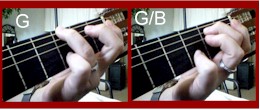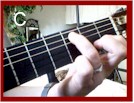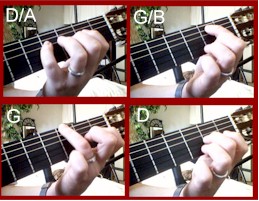Scroll through the lesson and click on notation/video/audio links to load the interactive players.
Please subscribe to get full access to all lessons for only $7.95/month PLUS 1 week free trial.

Riff Interactive lessons are
LESS expensive and
MORE interactive than alternatives!
More Info
|
|
| Lesson Subject:
Beginning Classical Guitar |
| What you learn:
Minuet (J S Bach) |
| Teacher:
Storm Stenvold |
Lesson Sample - Minuet
Storm:
Hey everyone. We have a little Bach & Roll, the song is... "Minuet" from Johann Sebastian Bach.
Bach is one of the giants of classical music and even though he didn't compose
music for the guitar, many of his songs have been adapted nicely to the instrument. Minuet is in the key of G and has a 3/4
time signature. The lesson sample is performed in
'adagio' tempo, which translates as 'slow' which is about 70-95 beats per
minute. I like the slow, lyrical tempo
for the piece.
Storm: The music is polyphonic, meaning it has more
than one part. The melody line in Minuet is handled by the fingers - index
and middle primarily and the bass line is handled by the thumb. Try to keep both parts separate and true to their timing. Here
are the first two
bars.
Storm:
The left hand fingering is a bit unusual for this section, for instance, notice
how you use the fourth
finger on the 3rd fret/2nd string.
Bars 1-2

Storm:
Adjusting finger placements is quite common in music with a bass line and melody
line working together. The fingering adjustment is needed to account for
the notes to be played next.
Storm:
Notice how the bass notes are played over the 'G' chord. The melody based on C
then changes in the second two bars and then back to G using the B
bass note.
Bars 3-4

Storm:
All F's in the song are sharp.
Storm:
Here are bars five and six.
Bars 5-6

Storm: The A bass note in bar five implies an A
minor chord with melody. The sixth bar returns to a G bass note and G major
chord.
Storm:
The seventh and eighth bars are more active in the bass line. The bass notes in
bar 7 change from D to G on
each beat.
Bars 7-8

Storm: There are no bass notes on the first beat of
bar eight. Notice the eighth notes descending while the melody note a stays static,
again implying there is a D chord at the base of this section.
Storm:
Bars 9 and 10 restate the melodic theme of bars 1 and 2. Note the different
bass lines are more active and descending from the '3rd', B.
Storm: In bar 12 you repeat the eighth note bass line.
Storm: Winding our way home now. The low F# in
bar 13 should be played with the 'pad' of the second finger. Barre your finger across to the A note on the 3rd
string and then moving to Am to D/F# in bar 13. The last two bars go to G
major in bar 14. .
Storm:
There is no bass note in the third beat of bar 15 or the first beat of bar 16
that bring out the melodic emphasis. Hold the last melody G note while
bringing out the bass notes on the last two beats.
Storm:
Next lesson I will feature another famous composer for classical
guitar. Have fun and learn something
new.
|
<< load notation from left
|
|
<< load audio from left
|
<< load audio from left
|